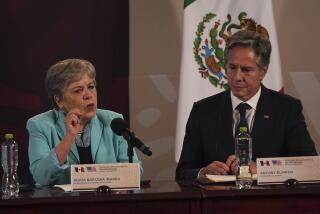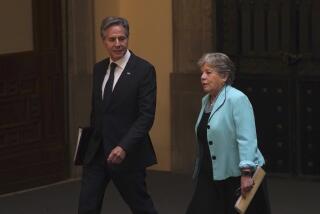Obstacle to Peace
- Share via
As many Latin Americans see it, the major obstacle to peace in Central America is neither Nicaragua’s Marxists nor El Salvador’s guerrillas but Washington’s Reagan Administration.
That became clearer than ever recently when a top Venezuelan official told The Times that the Contadora Group’s effort to stop the shooting is doomed “unless we obtain a clear definition of support from the Reagan Administration for a realistic agreement in the region.” He warned that a Contadora summit meeting scheduled for later this month might be indefinitely postponed unless there is a positive sign from Washington.
The Contadora Group--named after a Panamanian resort island where diplomats from Venezuela, Mexico, Colombia and Panama met two years ago to launch a peacemaking effort--has been trying to write a treaty that could be signed by the five nations of Central America. A draft version has been ready for several months, but the negotiating process has bogged down because U.S. allies in Central America--El Salvador, Honduras and Costa Rica--are demanding revisions. The Venezuelans are now convinced that none of the three will sign a treaty with Nicaragua unless the United States gives the nod.
According to the top official of the government of President Jaime Lusinchi, Venezuelan suspicions were first raised by National Security Council documents leaked to U.S. newspapers late last year flatly stating that the United States had “effectively blocked” the Contadora process because some Reagan Administration officials considered the draft treaty “unsatisfactory.” The actions taken by the Administration last week with regard to Central America probably confirmed those suspicions.
Last Monday, Pentagon officials announced a new round of military maneuvers in Honduras. Those operations by U.S. land, air and sea units are clearly designed to intimidate the Sandinista government in neighboring Nicaragua, and the latest twist to the psychological ploy is the importation of U.S. Army tanks into Honduras. This escalation of the military situation in Central America is needlessly provocative, because tanks are largely ineffective weapons in the region’s rugged terrain.
On Tuesday, Langhorne A. Motley, President Reagan’s assistant secretary of state for Latin America, appeared before Congress to ask for more U.S. aid for the anti-Sandinista rebels, known as contras, who are waging a covert war against Nicaragua. Motley insisted that the United States cannot effectively pressure the Sandinistas to change their foreign and domestic policies without leverage provided by the contras .
Motley is wrong. A barely covert war with no chance of victory is no way to pressure a hostile government. It only increases hostility, makes a later reconciliation more difficult to achieve and creates opportunities for violence to get further out of hand.
It would be far more effective for the United States to deal with the Sandinistas through other Latin American nations, especially those with governments with which they have been friendly and trust. That definition includes the four nations of the Contadora Group. And their draft treaty includes the very things that the Reagan Administration claims it wants in Central America: the reduction of arms acquisitions by countries in the region, withdrawal of foreign military advisers, establishment of a formal mechanism for the peaceful settlement of regional disputes, and a commitment to democratic forms of government.
The problems with the Contadora process are to be found not in the treaty’s fine print but in the fact that the Reagan Administration has not made more of an effort to cooperate with the Contadora countries. Unless the Administrations changes its course, the Venezuelan assessment of who is to blame for the continuing crisis in Central America will prove correct.
More to Read
Sign up for Essential California
The most important California stories and recommendations in your inbox every morning.
You may occasionally receive promotional content from the Los Angeles Times.










